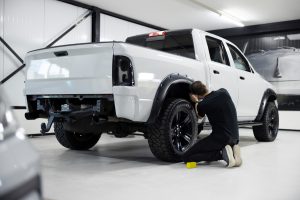


When you decide to trade in your car, having the right documentation is paramount. So, what happens if you find yourself in possession of a vehicle but not the accompanying title?
You might wonder, Will a dealership take a trade-in without a title? The short answer is yes, but there are essential steps to follow.
In this guide, we’ll unravel the mystery behind trading a car without a title, exploring legal methods and expert tips to help you smoothly navigate the process.
Contents ShowGather your car keys, the owner’s manual, your driver’s license, and proof of auto insurance. Most importantly, ensure you have the vehicle’s original title and registration. This paperwork serves as the foundation of a hassle-free trade-in process.
Providing meticulous maintenance records and service receipts demonstrates your commitment to keeping the vehicle in top-notch condition. Dealerships appreciate this effort and might offer a higher trade-in amount in return.
The title of your vehicle is essentially its ownership certificate. It proves that you are the rightful owner, and without it, the dealership can’t legally process the trade-in. If you find yourself in a situation where the title is missing, don’t panic; there are viable solutions.
Having an existing car loan doesn’t necessarily hinder your trade-in prospects. Reach out to your lender and understand their preferred transfer process. Typically, the dealership or the company buying your trade-in can assist you with the financing paperwork.
If your car’s value exceeds the loan balance, you might even enjoy positive equity, which can be applied as a credit toward your new car’s down payment.
To determine positive equity, subtract the remaining loan balance from your car’s current value. If the result is positive, you have equity that can be used toward your new car’s down payment.
Misplacing the title doesn’t mean you can’t trade in your car. You can request a duplicate title from your local Department of Motor Vehicles (DMV) or Secretary of State. The process may vary by state, but it generally involves providing necessary details and paying a replacement fee.
In some states, vehicles older than a certain age might not require a title for registration. For instance, if your car is over 15 years old, you might only need a bill of sale for registration. Additionally, if your name isn’t on the title due to inheritance or divorce, specific procedures, such as a title transfer, need to be followed.
In states with ELT programs, like the 24 states in the United States, you can trade in your car without a physical title. Dealerships participating in ELT programs can confirm and transfer ownership electronically, making the process much more convenient.
If you’re trading in a car without a title, dealerships will require alternative proof of ownership. This could include state vehicle registration, a bill of sale, or a manufacturer certificate of origin. Ensuring you have these documents ready is crucial.
Determining your car’s trade-in value is a crucial step. Utilize reputable online resources like Edmunds® and Kelley Blue Book (KBB®) to estimate the value accurately. Armed with this information, approach local dealerships or online car shopping services for quotes. Having a clear understanding of your car’s value helps you make informed decisions.
Yes, many dealerships have procedures in place for handling transactions without immediate access to the title. They often verify ownership through the DMV and may require additional paperwork, such as your vehicle registration, to facilitate the sale smoothly. Trustworthy dealerships have established protocols to handle these situations efficiently.
In the realm of car trading, having a clear understanding of the title requirements is essential. While a missing title can complicate matters, knowing the appropriate steps and having the necessary documents can make the process smoother. Stay informed, ask questions, and work closely with your dealership to ensure a hassle-free trade-in experience.
Maintain open communication with the dealership. Provide all alternative proofs of ownership and follow their guidance throughout the process.
Yes, you can still trade in your car without the owner’s manual. While it’s a valuable addition, dealerships primarily focus on essential documents like the title, registration, and maintenance records.
Losing your car keys might reduce the trade-in value slightly, but it’s not a deal-breaker. Dealerships can often assist in obtaining replacement keys if needed.
Yes, many car dealerships accept non-running cars for trade-ins. However, the trade-in value will likely be lower, reflecting the cost of necessary repairs.
Yes, you can trade in a financed vehicle without the title. However, you must provide proof of ownership through your finance agreement.
Justin Smith is a highly skilled freelance writer with over three years of experience in content editing, writing, and SEO. Specializing in the automotive industry and car trade insights, she delivers valuable and engaging articles. With a passion for cars and a focus on keyword ranking, Justin Smith's expertise empowers readers to navigate the complexities of buying and selling vehicles. Choose Justin Smith as your trusted author for authoritative car trade insights.
September 27, 2023

September 25, 2023